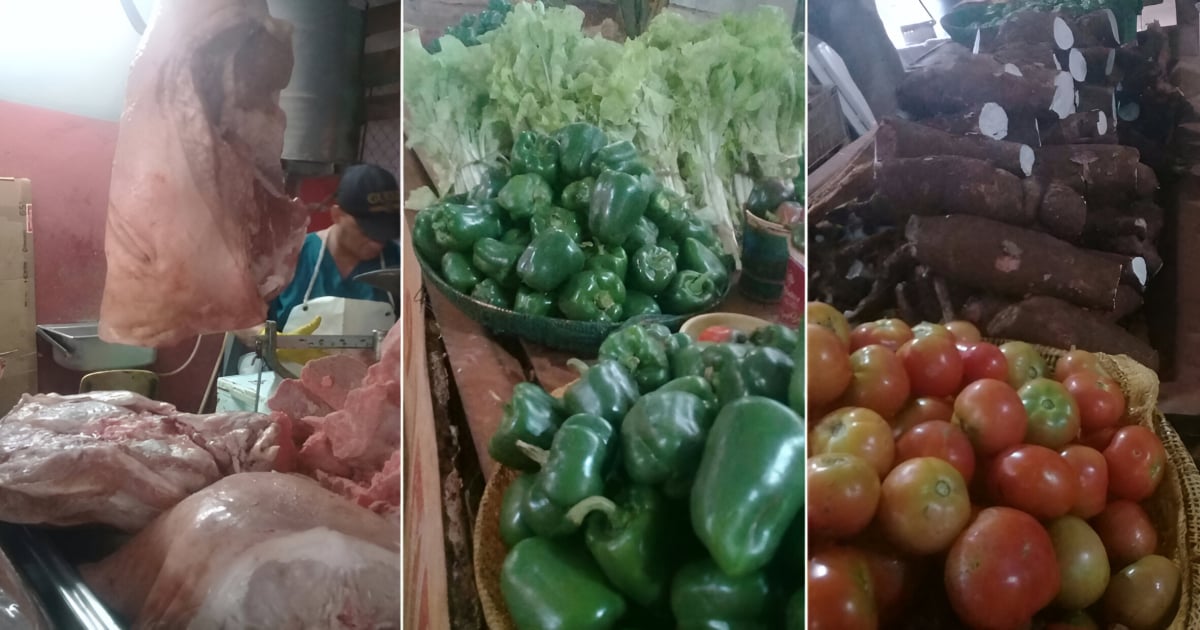Inflation continues to severely impact the finances of Cuban citizens. With Christmas and New Year's just around the corner, the cost of food and essential products in Havana has soared to alarming levels, leaving many families struggling to ensure a festive meal. The food crisis has worsened following the regime's recent economic measures, which included eliminating subsidies for the basic food basket, further straining the Cuban diet.
This year, Cubans must purchase all their food from local markets, creating a "survival of the fittest" scenario. For many, holiday tables will remain mostly empty, with no food or family members to celebrate these holidays together in Cuba.
Pork: A Luxury for Cuban Tables
According to data collected by CiberCuba from various markets in Havana, pork, a staple in Cuban holiday dinners, is now a luxury item. Pork shoulder costs between 1,100 and 1,300 pesos per pound, while pork steak is priced at 1,500 pesos. A pork leg, traditionally used for large celebrations, ranges from 780 to 800 pesos per pound. These prices are out of reach for most Cubans, whose wages fall far short of what is needed to purchase these goods.
Staples Like Rice and Beans Become Unaffordable
Even basic ingredients for the traditional "congrí" are beyond the reach of many families. Creole rice is selling for an average of 200 pesos per pound. Black and red beans are priced as high as 450 pesos per pound. This is a significant blow, as beans are essential in the daily diet of Cubans.
Rising Costs of Chicken and Other Animal Products
Once considered a more affordable option, chicken has also seen a substantial price increase. A 2.5-kilogram package costs around 5,200 pesos. Chicken breasts are priced at 5,000 pesos per kilogram, and a whole boneless chicken costs 4,800 pesos. Even eggs, previously an accessible choice, are now sold at 3,300 pesos for 30 units.
Vegetables and Tubers: Another Financial Burden
Vegetables and tubers, crucial components of any Cuban meal, also display exorbitant prices. Malanga costs between 120 and 150 pesos per pound, while sweet potatoes and yucca, popular options, have average prices of 52.50 pesos and 45 pesos per pound, respectively. Cachucha peppers are sold at 600 pesos per pound, and a bunch of carrots costs between 300 and 400 pesos. Other products like mangoes and bananas are also expensive, with banana fruit reaching 200 pesos per pound.
The Impact of Subsidy Removal
The gradual cessation of subsidized food from the ration book has exacerbated the situation. Products like rice, powdered milk, and bread, once available at minimal costs, now depend on the market, where prices are exorbitant. This regime measure, intended to reduce state spending, leaves thousands of families unable to meet their basic needs.
The Challenging Cuban Economic Landscape
The combination of insufficient wages, rampant inflation, and the removal of food subsidies has placed the majority of Cubans in a difficult position. The chance of enjoying a traditional Christmas dinner is dwindling, and many families face the dilemma of choosing between food or other basic necessities. As the holidays approach, Cubans' hopes are overshadowed by an increasingly critical economic outlook, where access to essential products has become a luxury and economic uncertainty dominates daily life.
Understanding Cuba's Economic Crisis
What has caused the rise in food prices in Havana?
The increase in food prices is primarily due to inflation and the regime's recent economic measures, including the removal of subsidies for the basic food basket, which have exacerbated the food crisis in Cuba.
How are Cubans coping with the high cost of living?
Many Cubans are struggling to cope with the high cost of living, as their wages are insufficient to keep up with the soaring prices of essential goods, forcing them to make difficult decisions about prioritizing basic needs.
What impact has the removal of food subsidies had on Cuban families?
The removal of food subsidies has left many Cuban families vulnerable, as they now must purchase essential goods at market prices, which are unaffordable for most, further straining their ability to meet basic needs.
